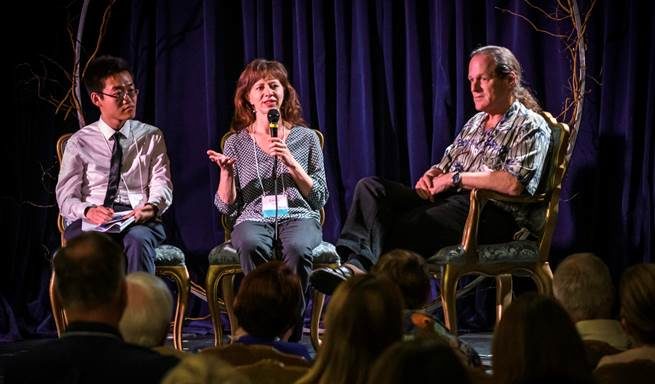‘Reimagine,’ ISB’s annual fundraiser, raises nearly $35,000 for groundbreaking science
 isbscience.org/news/2019/06/17/reimagine-event-funds-isb-science/
isbscience.org/news/2019/06/17/reimagine-event-funds-isb-science/
Dr. Laura Heath, center, addresses the crowd at ISB’s annual “Reimagine” fundraising event on June 13, 2019, as graduate student Yapeng Su, left, and ISB President Dr. Jim Heath look on. (Photo by Kai Chinn)
Past, present and future were on display at “Reimagine,” ISB’s annual fundraising event held Thursday at The Ruins.
Legendary biologist and ISB Co-founder Dr. Lee Hood recalled starting the first-of-its-kind organization focusing on systems biology back in 2000. “Creating a cross-disciplinary environment is ideal for doing cutting-edge science,” Hood said. “Looking back, we did it and we did it well.”
Hood led ISB until handing over the reigns to renowned scientist Dr. Jim Heath. “When I was thinking about a succession plan, Jim was at the very top of my list, and we were lucky to get him,” he said of Heath, who took over as ISB president on January 1, 2018.
At “Reimagine,” Heath spoke about democratizing health care, and ISB’s focus on personalizing health care through scientific wellness. How do you personalize therapy at the highest level, and do it proactively before disease hits, he asked. “We learn,” he said, comparing it to Netflix’s algorithms that suggest individualized content just for you. “Like Netflix, you wouldn’t treat everyone the same,” he told a crowd of about 75 people.
Heath then welcomed two scientists on stage: Yapeng Su, a Caltech graduate student working in Heath’s Lab who is studying drug resistance in cancer treatments, and Laura Heath (no relation to Jim), a research scientist in the Hood-Price Lab who is working to understand Alzheimer’s Disease and brain health.
“Systems biology is changing the way we think about cancer treatments,” said Su, who is studying how cancer cells act as “chameleons” and whose changes often negate the effectiveness of cancer drugs, sometimes in a matter of hours after being taken.
PHOTOS: View a gallery of photos from the event
Laura Heath, ISB’s only epidemiologist, works collaboratively with data scientists. Their backgrounds are wildly different, but the cross-disciplinary setting of ISB is fertile ground for learning. “I learn from them, they learn from me,” she said. “Collaborators are intrigued by ISB, and want to work with us,” she added.
The evening wrapped up with several people in attendance speaking about why they give to ISB. For some, it’s the collaborative nature that is accelerating scientific breakthroughs. For others, it is ISB’s focus on important areas of study, such as scientific wellness, brain health and cancer. And others give because of ISB’s passion and focus on improving STEM education.
The annual fundraiser was emceed by Dr. Christine Schaeffer, and raised nearly $35,000.
“Our contributors give to ISB in many ways — work, wealth and wisdom,” said Nick Newcombe, ISB’s director of development. “We appreciate everyone who attended ‘Reimagine,’ and we are thankful to everyone who gives so we can continue changing the world with our research and education programs.”





